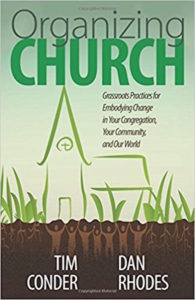 Grassroots Practices for Embodying Change in Your Congregation, Your Community, and Our World
Grassroots Practices for Embodying Change in Your Congregation, Your Community, and Our World
Amidst a pivotal era of change and mass movements, the church is poised to mobilize congregations with the embrace of community organizing. In their newest release, Tim Conder and Dan Rhodes offer a field guide to fulfill this calling and renew churches as leaders at the forefront of social justice issues. Organizing Church equips faith believers to respond to the challenges presented by the global culture of the 21st century, revitalizing the intersection of faith and action within congregations.
Reviews and endorsements of the publication include:
“In a season of fearful speculation about what the future holds for the Church, I believe more than anything that the future belongs to churches who have deep relationships, strong local commitments, and a community ethic of working toward a beloved community. In other words, I believe the future of the church belongs to churches like Tim’s, churches you will likely never hear about who do the quiet work, day in and day out, of faithful discipleship. Many pastors and faith communities want to be this kind of church; most don’t know how. This book is for them. With clarity of vision and a plethora of practical applications, Organizing Church will guide your congregation toward being an active participant in both personal and communal transformation in your community. I highly recommend this book to pastors, lay leaders, and all followers of Jesus who are looking to reexamine their understanding of church and reclaim its prophetic and transformative role in society.”―Danielle Shroyer, author, speaker, pastor
“J. I. Packer once observed that the problem of evangelical and free churches is they suffer from a ‘stunted ecclesiology.’ If his diagnosis was correct, and I believe it was, then Conder and Rhodes offer the equivalent of an ecclesial growth hormone therapy. The ecclesiology they propose begins at the level of practice and moves to theological reflection. This book should be at the top of the list for anyone seeking to understand what it means for congregations to be the Body of Christ’s continuing presence in the world.”―Curtis W. Freeman, Duke University Divinity School, author of Contesting Catholicity and Undomesticated Dissent
“You think you have heard about white evangelicals in politics. But have you heard this other (very different) story that Conder and Rhodes tell? One of congregations organizing for justice with black and brown sisters and brothers, learning from the IAF and the NAACP, working for justice for all people and creation, participating in bringing the kingdom Jesus preached? The former might win you the White House. But the latter is bigger and more lasting—it points to–no, it is–the Beloved Community. This book is brimming with grace and wisdom and hard work and good cheer.”―Jason Byassee, Vancouver School of Theology
To read more on this publication, click here. Find more information on Rhodes’s current writing project on Cesar Chavez with SILT 16/17: Can I Get a Witness? here. To be directed to the SILT 16/17 initiative page, click here.
Daniel Rhodes is the faculty coordinator of contextual education at the Institute of Pastoral Studies at Loyola University Chicago. His work centers on “The History of the Future: Apocalyptic, Community Organizing, and the Theo-politics of Time in an Age of Global Capital.” Rhodes is interested in political theology, broad-based community organizing, capitalism and Christianity, globalization, sovereignty and governance, and war and peace studies.
Fellow travelers are scholars, activists, and practitioners that embody the ideals and commitments of the Project on Lived Theology. We admire their work and are grateful to be walking alongside them in the development and dissemination of Lived Theology.
